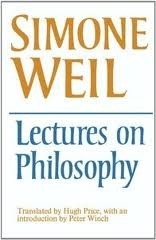
Lectures on Philosophy
By Simone Weil
1959
First Published
3.98
Average Rating
322
Number of Pages
Simone Weil's Leçons de Philosophie are derived from a course she taught at the lycée for girls at Roanne in 1933-4. Anne Reynaud-Guérithault was a pupil in the class; her notes are not a verbatim record but are a very full and, as far as one can judge, faithful rendering, often catching the unmistakable tone of Simone Weil's voice as well as the force and the directness of her thought. The lectures form a good general introduction to philosophy, ranging widely over problems about perception, mind, language, reasoning and problems in moral and political philosophy too. Her method of presentation is a characteristic combination of abstract argument, personal experience and literary or historical reference. Peter Winch points out in his introduction to the book some of the more systematic connections in her philosophical work (and between this philosophical work and her other concerns), and makes a number of suggestive comparisons between Simone Weil and Wittgenstein. The translation is by Hugh Price from the Plon edition of 1959. Dr Price has added some notes to explain references in the text that might be unfamiliar to English speaking students beginning philosophy.
Avg Rating
3.98
Number of Ratings
96
5 STARS
30%
4 STARS
42%
3 STARS
25%
2 STARS
2%
1 STARS
1%
goodreads
Author

Simone Weil
Author · 51 books
Simone Weil was a French philosopher, Christian mystic, and social activist. Weil was born in Paris to Alsatian agnostic Jewish parents who fled the annexation of Alsace-Lorraine to Germany. Her brilliance, ascetic lifestyle, introversion, and eccentricity limited her ability to mix with others, but not to teach and participate in political movements of her time. She wrote extensively with both insight and breadth about political movements of which she was a part and later about spiritual mysticism. Weil biographer Gabriella Fiori writes that Weil was "a moral genius in the orbit of ethics, a genius of immense revolutionary range".